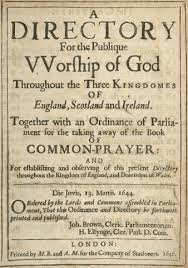Puritan Preaching: Westminster's Directory

Feb 16, 2016

"Preach it, brother!" We've all heard the exhortation. But what does it mean to preach? And how should one preach? In part 1 of my series on Puritan Preaching we looked at John's Bunyan's, The Pilgrim's Progress. Here I want to draw out the principles on preaching from the Westminster Assemby's (1643-1648) A Directory for the Publick Worship of God published in 1645. This guide to worship was meant to replace the Church of England’s mandatory Book of Common Prayer, yet without being imposed on churches.
In its fourth major section, “Of the Preaching of the Word,” the Directory called preaching, “the power of God unto salvation, and one of the greatest and most excellent works belonging to the ministry of the gospel.” This being the case, the preacher should perform it as a workman in such a way that he need “not be ashamed, but may save himself and those who hear him.” The one called to preach should do so with the following characteristics:
- Painfully, not negligently. Preparation for and the actual act of preaching requires diligence and exertion. Preaching is costly in preparation and delivery. There’s no place for slackers in the pulpit.
- Plainly, that the "meanest” (most common uneducated) person may understand. Why are we trying to impress people with learning that often goes over their heads? Also, we must not forget to address even the young children in the congregation. As one homiletician once said, give your people a K.I.S.S.—Keep it simple stupid!
- Faithfully, for the honor of Christ and the spiritual good of the people not our own gain or glory. We must humbly tell them what they need to hear without fear of even the biggest financial giver. 1 Thessalonians 5:14 is very informative here: “admonish the idle, encourage the fainthearted, help the weak, be patient with them all” (ESV).
- Wisely, unfolding the sermon in such a manner as may be most likely to prevail. We must give careful (not slavish) thought to how we say what we say for the greatest impact on all the hearers. This relates to both content and application. We cannot spend all of our time preparing the content of the message without concern for its structure and delivery. Fine cuisine does not belong on a paper plate.
- Gravely, as becometh the Word of God, shunning anything that would leave people disgusted with us. For example, we can use humor appropriately without acting like a clown; speak plainly without being a trash-mouth; effectively use expressions and emotions without being a dramatist; and share personal experiences without speaking excessively and proudly of ourselves.
- With loving affection, that people may see a godly desire to do them good. In Christ, lovingly plead with them for the good of their souls. Do our people come away with the conviction that we really care about them when we preach? Or, do they get the idea that we just want to beat them over the head with our big Bibles?
- As taught by God, “and persuaded in his own heart” of the truth of Christ proclaimed. By all means, preach the whole truth, but also “earnestly” practice it “before the flock.” Great preaching is so easily undone by our failure to own it (not perfectly but truly) in an exemplary way.
While the Directory was not intended to be an exhaustive guide to homiletics (the art and science of preaching), it still provides helpful guidance for the preacher in the twnety-first century. Preach it, brother!





